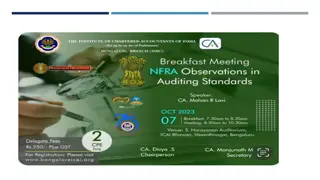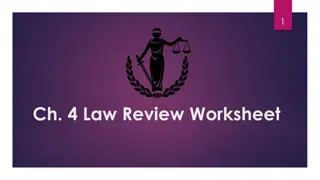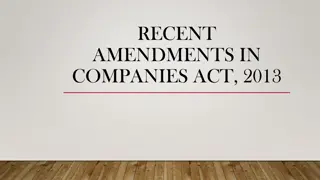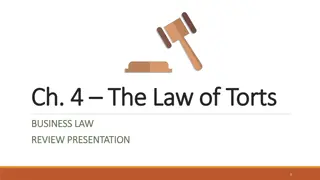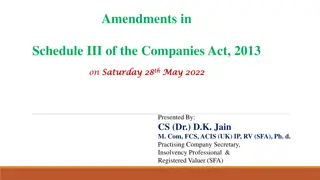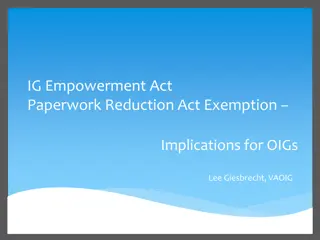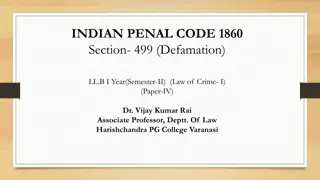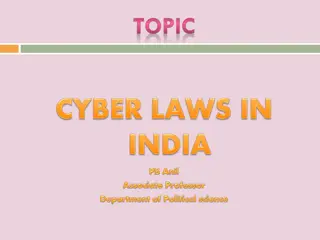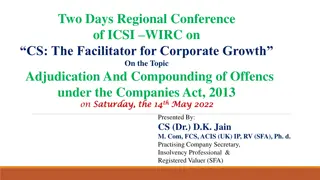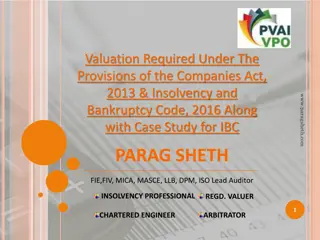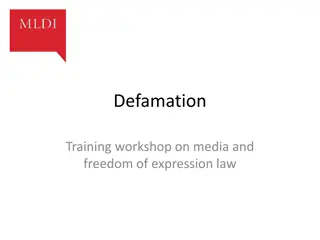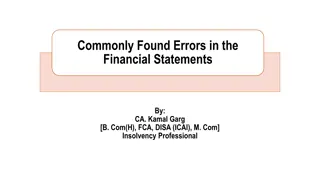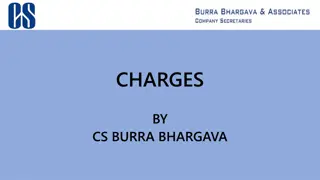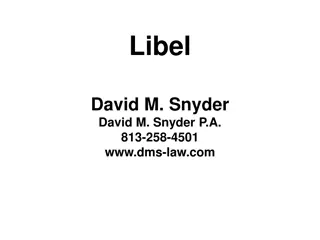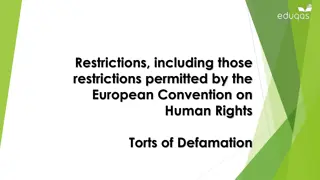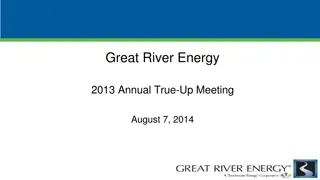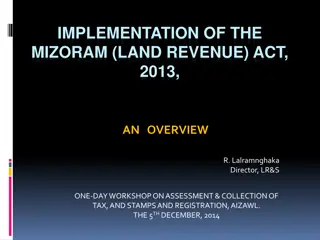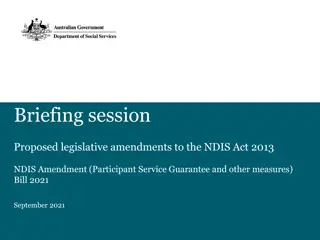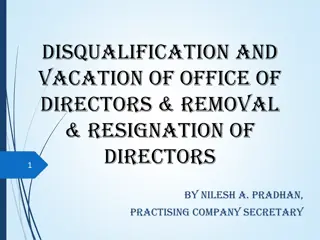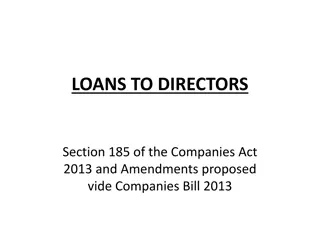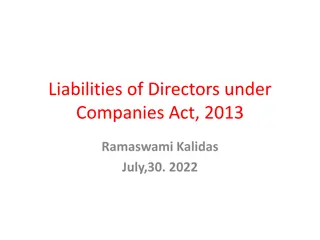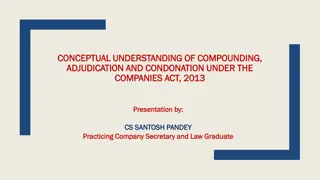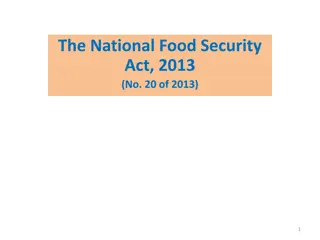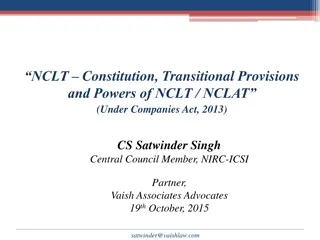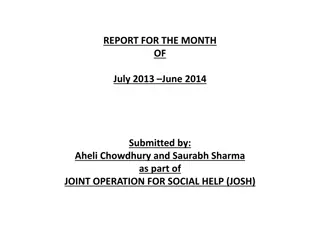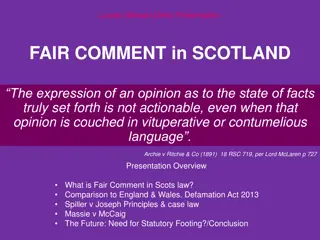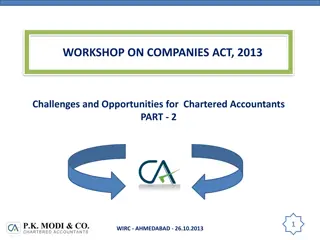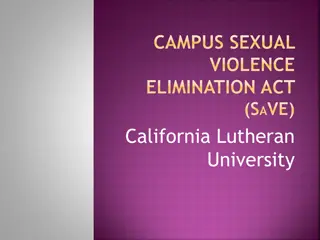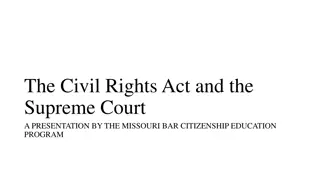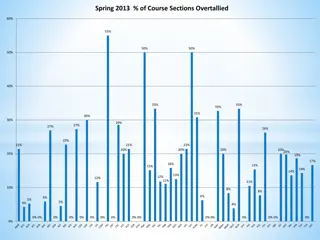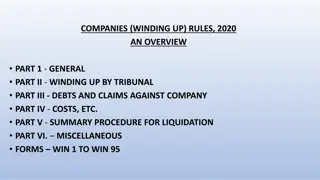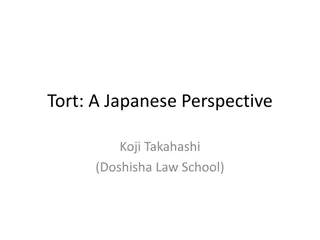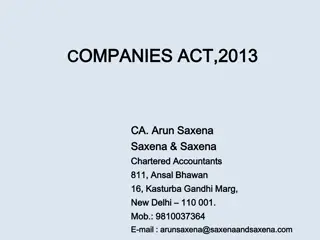What’s the difference between Office 2013, 2016, 2019 and Office 2021 (1)
\n1. Office 2013: Released in January 2013, Office 2013 introduced a new user interface with a focus on touch optimization. It offered applications like Word, Excel, PowerPoint, Outlook, Access, Publisher, and OneNote. Notable features included improved collaboration and cloud integration with OneDr
3 views • 7 slides
Understanding the Impact of Sections 143(9) and 143(10) of Companies Act, 2013
Exploring the significance of Sections 143(9) and 143(10) of the Companies Act, 2013, and their implications on active regulators, worried investors, and normal auditors. The session delves into defending past audits, highlights auditing standards in India, and provides insights into regulators' obs
0 views • 54 slides
Understanding Basic Legal Concepts Review
This content covers essential legal terminology such as crime, tort, intentional vs. unintentional torts, defamation, libel, slander, and elements of negligence in an easy-to-understand format. It provides definitions and explanations regarding fundamental legal principles that are crucial for anyon
1 views • 22 slides
Recent Amendments in Companies Act, 2013: An Overview
The Companies Act, 2013, a significant legislation in India, underwent amendments to enhance corporate governance and compliance. Passed in 2012, the Act regulates aspects of corporate entities, fostering transparency and accountability. The amendments aim to adapt to evolving business landscapes an
0 views • 123 slides
Understanding the Basics of Torts in Business Law
Explore the fundamental concepts of torts in business law through an overview of various types of wrongful acts, such as interference with enjoyment, defamation, negligence, injunctions, strict liability, intentional torts, and trespass. Learn about the responsibilities and liabilities associated wi
0 views • 41 slides
Significant Amendments in Schedule III of the Companies Act, 2013
Schedule III of the Companies Act, 2013 has been amended to include instructions for the preparation of financial statements for different categories of companies. Key changes relate to rounding off figures based on total income, definition of turnover, and disclosure requirements for shareholding o
0 views • 29 slides
Understanding Implications of IG Empowerment Act and Paperwork Reduction Act
The IG Empowerment Act provides beneficial provisions for Inspector Generals (IGs) such as exemptions from certain acts, including the Computer Matching Act and Paperwork Reduction Act. The Paperwork Reduction Act requires federal agencies, including IGs, to obtain OMB clearance before conducting su
1 views • 25 slides
Understanding Defamation Laws in Indian Penal Code 1860 Section 499
Indian Penal Code Section 499 defines defamation as making or publishing any imputation concerning a person intending harm or knowing it will harm their reputation. The section includes explanations regarding imputations towards deceased individuals, companies, and ironic expressions. To constitute
0 views • 10 slides
Understanding Cyber Laws in India
Cyber law in India encompasses the regulations governing cyber crimes, including theft, fraud, defamation, and more under the Indian Penal Code. The Information Technology Act of 2000 addresses modern crimes like cyber terrorism and credit card frauds. The necessity for cyber laws in India arises fr
0 views • 13 slides
Conference on Adjudication and Compounding of Offences under Companies Act, 2013
The Two Days Regional Conference of ICSI WIRC focusing on the facilitation of corporate growth through discussions on adjudication and compounding of offences under the Companies Act, 2013. The event, presented by CS (Dr.) D.K. Jain, covers topics like fraud, wrongful gain and loss, punishment for f
0 views • 51 slides
Interplay of Child Protection Laws and Right to Education in Sindh: Implications for SDG 4
The intricate relationship between child protection laws and the right to education in Sindh, particularly emphasizing the Sindh Child Marriages Restraint Act 2013 and the Sindh Right to Free & Compulsory Education Act 2013. These laws aim to safeguard children from early marriages and ensure access
0 views • 12 slides
Overview of Valuation Requirements under Companies Act, 2013 & IBC 2016
This text provides insights into the valuation requirements stipulated by the Companies Act, 2013 and the Insolvency and Bankruptcy Code, 2016. It includes sections demanding valuation reports from registered valuers, such as for share capital issues, audit committee terms, director transactions, cr
0 views • 54 slides
Understanding Defamation Laws: Media, Freedom of Expression, and Reputation
Exploring the intricacies of defamation laws, this content delves into the concepts of libel, slander, and reputation protection under various international treaties. It discusses the rights of individuals, public figures, and groups to pursue legal action for damage to reputation, as well as the co
4 views • 14 slides
Common Errors in Financial Statements and Legal Requirements Under Companies Act, 2013
Explore commonly found errors in financial statements and the legal requirements under the Companies Act, 2013, focusing on the correct presentation of company affairs, compliance with accounting standards, and proper disclosure of useful lives for depreciation on property, plant, and equipment. Und
0 views • 60 slides
Understanding Charges and Registration according to Companies Act, 2013
This comprehensive content covers the concepts of charges, registration of charges, fee structures, and penal provisions as per the Companies Act, 2013. It explains the duty of companies, fee structures for charges created before and after specific dates, and the importance of timely registration to
0 views • 12 slides
Jordan Penal Code Overview: Punishments for Various Offenses
Jordan's penal code details punishments for different offenses such as murder, assault, intentional harm, negligence causing death, defamation, and document tampering. Penalties include imprisonment with hard labor ranging from five years to fifteen years, and fines up to JD50. Specific articles out
0 views • 8 slides
Making Better Decisions Adviser Forum - Scenario #1 Decision Making Dilemma
During the final night of NOAC, a lodge adviser faces a challenging situation involving a prank orchestrated by the lodge chief and others that has deeply affected a 13-year-old Scout. The incident escalates when inappropriate photos are shared on social media, leading to a difficult decision-making
0 views • 27 slides
Understanding Libel Laws in Florida
Explore the definition of libel, how it pertains to publication of false statements, and the importance of truth as a defense against defamation. Learn about Florida jury instructions, the impact of literally true statements, and the complexities of proving the truth in a legal setting.
0 views • 20 slides
Social Media Risks and School Safety
Social media platforms like Facebook, Twitter, and Instagram pose risks such as cyberbullying, privacy breaches, and defamation issues for students. Information shared online can be used by bullies and predators, leading to potential harm and consequences like school discipline or arrest. Future imp
0 views • 34 slides
Understanding Defamation Law and Its Implications
Explore the intricacies of defamation law, including the requirements for proving a claim, available defenses, procedures for legal action, historical context, and comparisons between different Acts governing defamation. Learn about cases, elements of defamatory statements, and protections under the
0 views • 43 slides
Great River Energy 2013 Annual True-Up Meeting Summary
The Great River Energy 2013 Annual True-Up Meeting held on August 7, 2014, aimed to discuss the Regulatory Timeline, compare actual 2013 values to projections, review the Annual True-Up results, and address next steps. The meeting centered around the revised Formula Rate Protocols and the Annual Tru
1 views • 16 slides
Overview of the Mizoram Land Revenue Act, 2013
The Mizoram Land Revenue Act, 2013 replaced several previous regulations and came into effect on June 1, 2013. It establishes authorities for land management, outlines control and powers over land, and provides guidelines for land allotment for specific purposes. The Act designates the Government of
0 views • 18 slides
Proposed Legislative Amendments to the NDIS Act 2013 - Briefing Session
Proposed legislative amendments to the NDIS Act 2013 are discussed in a briefing session focusing on the Participant Service Guarantee (PSG) and other related measures. The amendments aim to enhance the NDIS framework, ensure timely decision-making, and improve service standards for participants.
0 views • 17 slides
Disqualification and Vacation of Office of Directors in Companies Act, 2013
Directors play a crucial role in companies per the Companies Act, 2013. They must adhere to specific qualifications and can face disqualification under Section 164, such as being of unsound mind, insolvent, convicted of offenses, or failing to comply with court orders. Understanding these regulation
0 views • 42 slides
Understanding Section 185: Prohibition on Loans to Directors in Companies Act 2013
Section 185 of the Companies Act 2013 prohibits companies from directly or indirectly providing loans, guarantees, or securities to their directors or related persons. The rationale behind this regulation is to prevent misuse of public funds, siphoning off money, and securing personal gains. This se
0 views • 22 slides
Understanding Liabilities of Directors under Companies Act, 2013
Director's liabilities under the Companies Act, 2013 include definitions of directors, shadow directors, officers, and those in default. Responsibility for default and potential prosecutions for wrongful actions are discussed. Changes in definitions and concepts are highlighted to illustrate the leg
0 views • 37 slides
Understanding Compounding, Adjudication, and Condonation under the Companies Act, 2013
This presentation by CS Santosh Pandey covers the conceptual understanding of compounding, adjudication, and condonation under the Companies Act, 2013. It explains the purpose of company law, compounding of offences, condonation of delay, adjudication of penalties, and differences between them. Addi
0 views • 48 slides
National Food Security Act, 2013 Overview
The National Food Security Act, 2013 (NFSA) aims to ensure food and nutritional security for all by providing access to adequate quality food at affordable prices. It includes provisions for hot cooked meals, food security allowance, social audit, nutritional support for children, and various monito
0 views • 15 slides
Evolution of NCLT and NCLAT Under Companies Act, 2013
The establishment and constitutional validity of the National Company Law Tribunal (NCLT) and National Company Law Appellate Tribunal (NCLAT) under the Companies Act, 2013 were upheld in a landmark judgment by the Supreme Court. The NCLT marks a new era in corporate adjudication, taking over jurisdi
0 views • 41 slides
Implementation of Right to Education Act: Status Report July 2013 - June 2014
Activities report for the month of July 2013 to June 2014 submitted by Aheli Chowdhury and Saurabh Sharma as part of Joint Operation for Social Help (JOSH). The report focuses on the implementation of the Right to Education Act, including advocacy efforts, school inspection processes, capacity build
0 views • 16 slides
Understanding Borrowing Powers of Companies under Companies Act, 2013
The term "Borrowing" in the Companies Act, 2013, pertains to the power granted in Section 180(1)(c) for companies to borrow money with the consent of the company by a special resolution. This includes provisions on limits, definitions of temporary loans, necessary board resolutions, and validity of
1 views • 8 slides
Understanding Fair Comment Defense in Scottish Law
Fair comment is a common law defense in Scots law that facilitates freedom of speech by allowing opinions on matters of public interest. Compared to English law, Scotland has different approaches to defamation, with the Defamation Act 2013 mostly applying to England and Wales. The defense of fair co
0 views • 7 slides
Challenges and Opportunities for Chartered Accountants under Companies Act, 2013
Explore the various penalties and punishments for defaults under the Companies Act, 2013 as discussed in a workshop held on 26th October 2013 in Ahmedabad. The session covered offenses such as misleading statements in prospectuses, fraudulent inducements, and fictitious applications for securities,
0 views • 33 slides
Campus Sexual Violence Elimination Act (SAVE) at California Lutheran University
Campus Sexual Violence Elimination Act (SAVE) was passed in March 2013 as part of the Violence Against Women Reauthorization Act, impacting institutions of higher education like California Lutheran University (CLU). The act mandates CLU to educate its community on prevention/awareness of sexual viol
0 views • 22 slides
The Civil Rights Act of 1964 and the Supreme Court
In the 1960s, Congress passed the Civil Rights Act of 1964, a pivotal legislation that prohibited discrimination in public accommodations. This act represented a significant shift in focus towards minority rights. The Supreme Court's past rulings on the Civil Rights Act of 1875 influenced Congress t
0 views • 24 slides
Analysis of Course Sections Overfilled in Spring and Fall 2013
Analysis of the percentage of course sections overfilled in Spring and Fall 2013 shows a range of rates across various subjects. Spring 2013 had a higher percentage of overfilled course sections compared to Fall 2013. The comparison between Spring and Fall 2013 courses indicates notable disparities
0 views • 8 slides
Criminazisation of Peaceful Expressions: A Case Study of India
Indian governments use laws like sedition and defamation to stifle dissent, despite PM Modi's call for free speech. The sedition law, a colonial-era relic, is used against activists and critics, with vague language allowing misuse. Famous cases, including the arrest of Kanhaiya Kumar, highlight the
0 views • 13 slides
Companies (Winding Up) Rules, 2020: An Overview
The Companies (Winding Up) Rules, 2020 provide guidelines for winding up a company by the Tribunal under the Companies Act, 2013. The rules cover various aspects such as modes of winding up, circumstances under which a company may be wound up by the Tribunal, definitions, forms, and more. It specifi
1 views • 110 slides
Japanese Tort Law: Choice of Law Rules and Double-Actionability
Japanese tort law follows specific choice of law rules, determining the applicable law based on factors such as the place of injury, product liability, and defamation. The double-actionability rule ensures that the harmful act is also unlawful under Japanese law and that remedies are available. This
0 views • 14 slides
Overview of Oppression and Mismanagement Provisions under Companies Act, 2013
This content provides detailed information about the provisions related to oppression and mismanagement as per the Companies Act, 2013. It outlines the eligibility criteria for members of shareholders to raise concerns, the power of the tribunal to intervene, and the possible orders that can be pass
0 views • 6 slides

